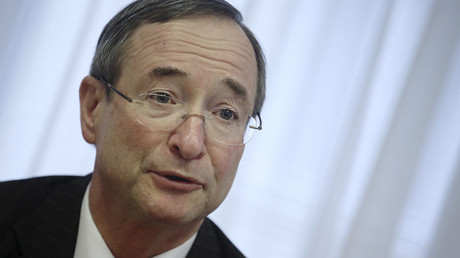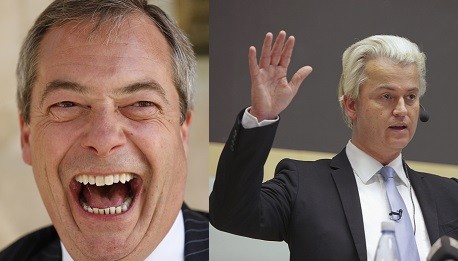For months now, Petro Poroshenko, the Ukrainian President, has been calling for the OSCE to have an armed mission in the Russian and rebel held territory of the Donbas in eastern Ukraine.
Now, as we approach the renewal of EU sanctions against Putin in July, the call to hold elections in the rebel-held territories of eastern Ukraine, as called for in Minsk2, is beginning to reach a crescendo.
Significantly, U.S. Assistant Secretary of State Victoria Nuland surprisingly flew into Moscow,
 " ... just a day before the Trilateral Contact Group meets in Minsk to try to
break a political deadlock over holding elections in Ukraine’s east,
known as the Donbas, where Russia-backed rebels control large swathes of
territory.
" ... just a day before the Trilateral Contact Group meets in Minsk to try to
break a political deadlock over holding elections in Ukraine’s east,
known as the Donbas, where Russia-backed rebels control large swathes of
territory.
...
The State Department said Nuland would meet with senior Russian government officials to discuss the situation in eastern Ukraine and the next steps to implement the Minsk agreements." (Daniel Schearf : VoA : May 17, 2016) (my emphasis)
What is further significant at this point in time is that the need for an armed OSCE monitoring of such elections is now being supported by a growing group of both EU countries and from countries on the international scene.
As reported by Interfax Ukraine,
 "Ukrainian President Petro Poroshenko has said that international
partners support Ukraine's idea about the deployment of an armed
peacekeeping mission in Donbas.
"Ukrainian President Petro Poroshenko has said that international
partners support Ukraine's idea about the deployment of an armed
peacekeeping mission in Donbas.
....
"At the moment, the main result that we have achieved is that both the OSCE and our partners from Germany and France, and an absolute majority of OSCE countries, and yesterday there was the statement by the defense minister of Turkey – everyone clearly say that they support Ukraine's position on the deployment of an armed police mission," (Interfax Ukraine : 14.05.2016) (my emphasis)

Even the propaganda sheet of Putin's Russian soldiers and rebels proxies in Donetsk have, interestingly, reported that,
" ... the Minister of National Defense of Turkey Ismet Yylmaz noted that Turkey supports the idea of expansion of the armed police mission under the auspices of OSCE in Donbass." (Dninews : 19.05.2016) (my emphasis)
And in-between reporting these developments, Putin's Russian soldiers and rebel proxies in eastern Ukraine have,
 "At dawn, militants used heavy artillery to attack Ukrainian Armed Forces. Near Novomykhailivka pro-Russian separatists shelled from 152 mm artillery systems, near Krasnohorivka – from 82 mm mortars.
"At dawn, militants used heavy artillery to attack Ukrainian Armed Forces. Near Novomykhailivka pro-Russian separatists shelled from 152 mm artillery systems, near Krasnohorivka – from 82 mm mortars.
During the day, a pro-Russian sniper operated against Ukrainian military in Avdiivka.
In Mariupol direction, near Pavlopol, Ukrainian forces were shelled from 120 mm mortars.
In Luhansk region, militants used grenade launchers and small arms to shell Ukrainian positions near Novozvanivka." (Live 112 TV : 18 May 2016) (my emphasis)
As also reported by Nolan Peterson that,
"The Ukrainian military is not the only group trumpeting warnings about a potential spike in the war.
For weeks, international monitors have reported a slight increase in cease-fire violations around the separatist stronghold of Donetsk in eastern Ukraine, as well as sporadic fighting along the length of the 200-mile-long front lines in Ukraine’s southeastern Donbas region, which borders Russia." (Newsweek : 4/10/16) (cf also : OSCE 16/5/2016)

It should also not be forgotten that Putin has ammassed 40,000 Russian troops on the Russian-Ukrainian border, as well as his 10,000 Russian troops operating in eastern Ukraine, whilst also carrying the economic burden of supporting his rebel-proxies in eastern Ukraine.
This raises the critical question of, "How many armed police should be sent to eastern Ukraine to effectively monitor any elections being held there?"
Furthermore, in light of the severe economic recession now gripping Putin's Russia, for how long can Putin allow much needed funds in Russia itself to be drained towards his rebel-held territory in eastern Ukraine?
 A year ago it was reported by Anna Dolgov (left) in the Moscow Times that,
A year ago it was reported by Anna Dolgov (left) in the Moscow Times that,
"Russia has spent 53 billion rubles from state coffers in the 10 months of the conflict in eastern Ukraine, according to estimates by the head of macroeconomic studies at the esteemed Higher School of Economics, Sergei Aleksashenko, one of the co-authors of the report, according to RBC." (Moscow Times : May. 12 2015)
How much Putin now continues to spend to prop up his soldiers and rebel-proxies in eastern Ukraine is really anybody's guess.
And, unfortunately for Putin, his gamble that the up-coming EU extension of the sanctions against him may be dropped now seems doomed to failure.
 As reported by
As reported by
The European Union is on track to renew economic sanctions on Russia over the crisis in Ukraine when they expire in July, though an extension could be contested and only short-term, diplomats and officials said.
...
 EU foreign policy chief Federica Mogherini told
German newspaper Die Welt on Thursday she expected the energy, financial
and defense sanctions to be renewed.
EU foreign policy chief Federica Mogherini told
German newspaper Die Welt on Thursday she expected the energy, financial
and defense sanctions to be renewed.
...
"If Ukraine does its homework and Russia continues to be an obstacle, then an extension of the sanctions shouldn't be a problem," a senior German official said. "Renzi may not be the big hurdle in the sanctions debate that he has been." (Reuters :
Now, as we approach the renewal of EU sanctions against Putin in July, the call to hold elections in the rebel-held territories of eastern Ukraine, as called for in Minsk2, is beginning to reach a crescendo.
Significantly, U.S. Assistant Secretary of State Victoria Nuland surprisingly flew into Moscow,
...
The State Department said Nuland would meet with senior Russian government officials to discuss the situation in eastern Ukraine and the next steps to implement the Minsk agreements." (Daniel Schearf : VoA : May 17, 2016) (my emphasis)
What is further significant at this point in time is that the need for an armed OSCE monitoring of such elections is now being supported by a growing group of both EU countries and from countries on the international scene.
As reported by Interfax Ukraine,
....
"At the moment, the main result that we have achieved is that both the OSCE and our partners from Germany and France, and an absolute majority of OSCE countries, and yesterday there was the statement by the defense minister of Turkey – everyone clearly say that they support Ukraine's position on the deployment of an armed police mission," (Interfax Ukraine : 14.05.2016) (my emphasis)

Even the propaganda sheet of Putin's Russian soldiers and rebels proxies in Donetsk have, interestingly, reported that,
" ... the Minister of National Defense of Turkey Ismet Yylmaz noted that Turkey supports the idea of expansion of the armed police mission under the auspices of OSCE in Donbass." (Dninews : 19.05.2016) (my emphasis)
And in-between reporting these developments, Putin's Russian soldiers and rebel proxies in eastern Ukraine have,
During the day, a pro-Russian sniper operated against Ukrainian military in Avdiivka.
In Mariupol direction, near Pavlopol, Ukrainian forces were shelled from 120 mm mortars.
In Luhansk region, militants used grenade launchers and small arms to shell Ukrainian positions near Novozvanivka." (Live 112 TV : 18 May 2016) (my emphasis)
As also reported by Nolan Peterson that,
"The Ukrainian military is not the only group trumpeting warnings about a potential spike in the war.
For weeks, international monitors have reported a slight increase in cease-fire violations around the separatist stronghold of Donetsk in eastern Ukraine, as well as sporadic fighting along the length of the 200-mile-long front lines in Ukraine’s southeastern Donbas region, which borders Russia." (Newsweek : 4/10/16) (cf also : OSCE 16/5/2016)
It should also not be forgotten that Putin has ammassed 40,000 Russian troops on the Russian-Ukrainian border, as well as his 10,000 Russian troops operating in eastern Ukraine, whilst also carrying the economic burden of supporting his rebel-proxies in eastern Ukraine.
This raises the critical question of, "How many armed police should be sent to eastern Ukraine to effectively monitor any elections being held there?"
Furthermore, in light of the severe economic recession now gripping Putin's Russia, for how long can Putin allow much needed funds in Russia itself to be drained towards his rebel-held territory in eastern Ukraine?
 A year ago it was reported by Anna Dolgov (left) in the Moscow Times that,
A year ago it was reported by Anna Dolgov (left) in the Moscow Times that,"Russia has spent 53 billion rubles from state coffers in the 10 months of the conflict in eastern Ukraine, according to estimates by the head of macroeconomic studies at the esteemed Higher School of Economics, Sergei Aleksashenko, one of the co-authors of the report, according to RBC." (Moscow Times : May. 12 2015)
How much Putin now continues to spend to prop up his soldiers and rebel-proxies in eastern Ukraine is really anybody's guess.
And, unfortunately for Putin, his gamble that the up-coming EU extension of the sanctions against him may be dropped now seems doomed to failure.
The European Union is on track to renew economic sanctions on Russia over the crisis in Ukraine when they expire in July, though an extension could be contested and only short-term, diplomats and officials said.
...
...
"If Ukraine does its homework and Russia continues to be an obstacle, then an extension of the sanctions shouldn't be a problem," a senior German official said. "Renzi may not be the big hurdle in the sanctions debate that he has been." (Reuters :












